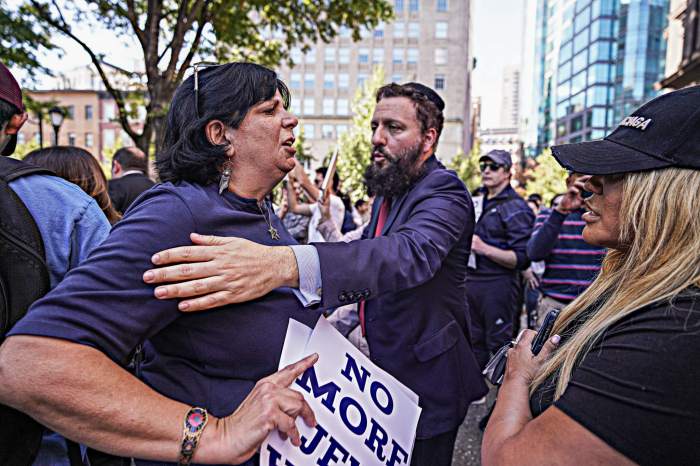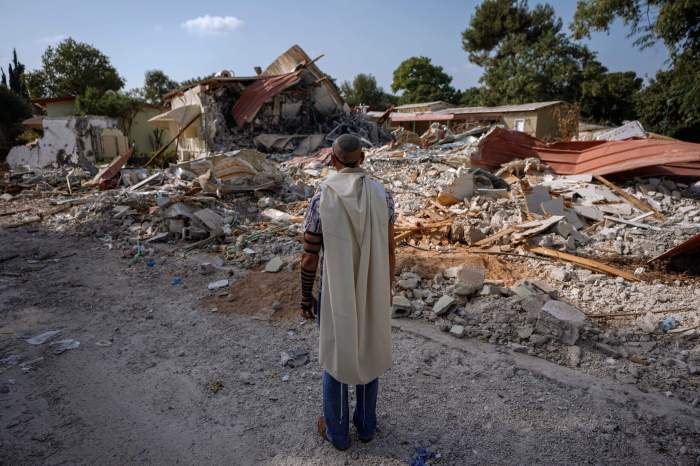Presidential elections force us to look at ourselves and our country. What kind of nation are we, and what kind do we want to be?
The 2016 campaign has been unnerving for so many reasons, but we may have gotten the election we deserve. Good economic times tend to paper over the nation’s divides. Stagnant times with growing inequality have exposed how unhealthy our politics have become, how out of touch the major parties are with those who have been left behind, and how some in the strongest nation in the world still have such a strong fear of the other.
This is an election driven by distrust of both candidates, the votes of many to be determined by who is the least unlikeable. An election where propriety has had no bounds, where in the final stretch the integrity of the FBI has come into question, and where a foreign rival violated our cyber security, releasing stolen information with the hope of influencing the results.
We learned that as old media declines and new media rises, the truth often is eclipsed. At a time when news abounds, our conversations now are shaped by lies, misinformation and disinformation.
As the election enters its final hours, friends have been lost and family members estranged, and worries about how the nation can move forward have taken hold. We have forgotten how to respectfully disagree.
This election isn’t about policy differences. It’s far more fundamental. The very structures and beliefs that define America, the thoughts and feelings that make us Americans, are out of alignment.
THE POLITICAL SYSTEM
As the candidates hammered away at a corrupt process dominated by party insiders and moneyed interests, others belittled its effectiveness in producing the two most disliked nominees in modern U.S. history in Hillary Clinton and Donald Trump.
Leaders of the Democratic and Republican parties will have to rethink who should be allowed to vote in their primaries and which criteria should determine which candidates participate in their debates.
The process was not the only source of discontent. Thanks to Bernie Sanders, Trump and WikiLeaks, it became clear that control of the party apparatus makes a big difference, unless it doesn’t. Sanders was stymied by the national Democratic organization. In contrast, Trump, by the power of his celebrity, forced the GOP to come around to his side, despite the objections of establishment political leaders. The parties were exposed as beholden to money and those giving it, listening only to the demands of their most powerful backers and giving lip service to the rest.
Those who are struggling economically are rejecting both big union leaders and the corporate class that abandoned them on jobs and trade. Many in the GOP who flocked to Trump early have realized that the old party line of tax cuts for the rich never produced any wealth that trickled down to them.
Some voters on the left don’t want another Clinton epoch of reduced regulation and a thinner social safety net, and they remember the mass incarceration of blacks in the 1990s.
Millennials who believe in government want more big government that does things correctly.
What gnaws at each wing and energizes its discontent is widening economic inequality.
Will the two major parties redefine themselves, or will new ones take root?
MONEY
This campaign was supposed to demonstrate the evil power of vast sums of money, raised by elites from elites, to influence elections in the wake of the Supreme Court’s Citizens United decision. Then came Jeb Bush. His shock-and-awe launch last year left him with more money than any other GOP candidate but he was steamrolled by Trump and couldn’t get past the South Carolina primary in February. The Koch brothers, huge Republican donors, did not spend their promised nearly $1 billion, focusing what they did spend mostly on down-ballot races.
Clinton’s machine did rake in piles of money, enough to nearly double its planned TV buy in the campaign’s final week. But when many people are no longer watching television commercials or no longer believing the ads they do see, what difference does it make how many you air? Twitter followers can be addressed for free.
Trump ran a parsimonious campaign, benefiting from his universal name recognition and ability to manipulate the media, especially television, into giving him tons of free publicity.
But money remained a big issue, especially for Clinton. Sanders hit her repeatedly on her $225,000 Wall Street speeches. WikiLeaks’ almost daily release of hacked emails exposed the cozy corporate cronyism at the heart of her orbit, as well as the unseemly aspects of the Clinton Foundation.
And Trump validated it all, acknowledging that as a real estate developer he played the give-something-to-get-something game, too. Change the system, he challenged. The public would agree.
A COARSENING OF OUR DISCUSSION
Trump dramatically descended the escalator in Trump Tower to begin his campaign by insulting Mexicans here illegally. From that moment, there would be no boundaries on the ugly rhetoric of this election season. Trump quickly branched out to all Latinos. And Muslims. And women. And African-Americans. And Syrian refugees. And people with disabilities. And overweight people. And virtually all of his rivals.
Lyin’ Ted. Little Marco. Low-energy Jeb. Crooked Hillary. Trump cursed, memorably defended the size of his genitals, and goaded Florida Sen. Marco Rubio into playing the insult game, to Rubio’s later chagrin.
In the second debate, the GOP nominee said his opponent would “be in jail” if he wins. For much of the campaign, Trump egged on crowds to shout, “Lock Her Up.” This is not how a democracy works.
Much of the public was disgusted. Yet many laughed, were receptive to Trump’s slurs, or were willing to overlook them because they believed his disregard for the rules was evidence that he would bust up a system that wasn’t working. Does this coarsening of campaign language end with him, or is it just beginning? Is it only about words or does it signal the erosion of our democratic principles?
FAITH IN INSTITUTIONS
In the summer of 2015, Sanders, a socialist senator from Vermont, and Trump, a Manhattan billionaire, began drawing crowds that dwarfed those of their rivals. Their message: Those in power are against you. The raucous response made clear that the electorate was angry. Americans were losing faith in government, Wall Street, religion and the media long before
Trump and Sanders came along. Now their disgust with the power brokers, the traditional gatekeepers, was palpable.
Campaigns now are conducted on social media. With no fact-checkers between him and nearly 13 million Twitter followers, Trump could retweet bogus race-based crime statistics that indicted African-Americans without his followers seeing any corrections or context. Social media also lets people associate only with those who think like them, and the echo chamber hardens their positions. Unjustified attacks and unsubstantiated accusations are not seen as such, and slowly but surely erode the social contract.
The trend shows no signs of abating. That’s worrisome. Technology did open up and level the playing field. It also helped further divide us, and it is poised to become the great disrupter of democracy.
THE OTHER
Denigrating “the other” didn’t start with Trump. It’s an old stain in America; almost all religious and ethnic groups were once outcasts. Racism is our nation’s original sin, but in civil society you keep your feelings private. Trump made it OK to wear your prejudice on your sleeve, under the guise of taking down the sacred cow of political correctness. He made it acceptable to loathe those who are different and those who are unfamiliar, and to embrace discriminatory policies like the banning of Muslims from entering the country.
The darkest and most extreme expression of that was his continued effort to undermine the presidency of Barack Obama and make him “the other” by questioning the place of his birth. Trump finally acknowledged his heinous lie by admitting that Obama was born in the United States, but he did not apologize for or admit the damage his racist meme had done. Nor did he put those birther thoughts or feelings to rest.
WOMEN
In the opening moments of the first GOP debate in Cleveland, Fox News host Megyn Kelly asked what is now one of the most famous questions in presidential debate history: “You’ve called women you don’t like fat pigs, dogs, slobs and disgusting animals … Does that sound to you like the temperament of a man we should elect as president …?”
It didn’t get any better. Trump’s past and present remarks about women, in a campaign that could result in the election of the nation’s first female president, are deplorable. A month after Kelly’s question, Trump insulted the appearance of GOP rival Carly Fiorina. Later, he said Clinton didn’t have the “look” of a president.
The issue ratcheted up in intensity when Clinton goaded him in their first debate into revisiting and continuing his insulting language toward former Miss Universe Alicia Machado. And it exploded with the release of an “Access Hollywood” tape in which Trump boasted that if you’re a star you can do anything to women. It was a startling expression of what a famous man saw as his power and prerogative over women, and it was disgusting.
But Trump’s words started a conversation about the abuse women endure from men every day, a conversation that must not end on Election Day.
No matter who wins the presidency or which party comes away with control in Congress, the problems and fissures exposed by the 2016 campaign are not going away. The expectation is that they could get worse, with the losers digging in to thwart the legitimacy of the winners. And the institutions we look to for leadership created some of these problems, stopped working and ceased to lead.
We know change must come. But moving the nation forward will require uncommon courage — from the next president and from the rest of our leaders. And when they summon that resolve, the rest of us must be willing to work with them.
Throughout this tortured campaign, we Americans have been united in making clear that we do not like the nation we have become. It’s our responsibility to put aside our differences when this is over and work together with whoever wins to help create an America all of us can believe in.

















